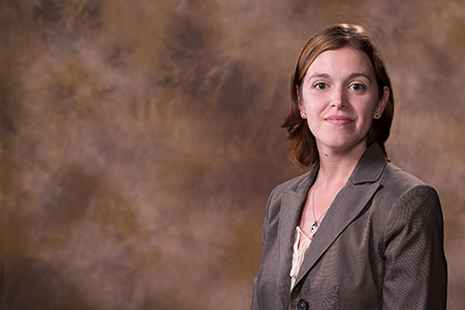FAYETTEVILLE, Ark. – The new holder of an endowed chair at the University of Arkansas brings with her several research projects examining complex issues of teacher quality.
The university appointed Gema Zamarro to the Twenty-First Century Chair in Teacher Quality. The position is one of six endowed chairs in the Department of Education Reform in the College of Education and Health Professions. The other chair holders focus on leadership, policy, accountability, school choice and education reform. Zamarro was formerly a researcher at the University of Southern California.
“We are pleased to welcome Dr. Zamarro, who has already achieved an impressive research record,” said Tom Smith, dean of the College of Education and Health Professions. “The Department of Education Reform has added significantly to the body of knowledge in several areas of education research as well as bringing in substantial external funding. We expect Dr. Zamarro to contribute to this successful trajectory.”
Zamarro, a native of Spain who received her doctoral and master’s degree from Centro de Estudios Monetarios y Financieros and her undergraduate degree from Universidad Carlos III de Madrid, continues to hold adjunct appointments where she formerly worked in California: adjunct senior economist at the USC Dornsife Center for Economic and Social Research and adjunct economist at the RAND Corporation. She has also held positions as professor of econometrics at the Pardee RAND Graduate School of Public Policy, assistant professor in the Department of Econometrics at Tilburg University in the Netherlands and junior research fellow at NETSPAR (Network for Studies on Pensions, Aging and Retirement).
“I’m excited about this new challenge,” Zamarro said. “My heart is in education. Here, I’m surrounded by people who are experienced in studying the U.S. education system. I have been following their research, exchanging academic papers with them, and I look forward to working with them on several topics.”
Zamarro’s research includes projects that examine the properties of value-added methods for estimating teacher quality and the use of value-added measures for evaluating quality in higher education. Value-added modeling refers to methods used to estimate teacher performance by calculating a teacher’s contributions to students’ test scores by comparing them with average test scores of students with similar backgrounds and characteristics taught by other teachers.
Teachers are considered to be highly effective if their students make above-average improvements relative to other teachers with comparable students, Zamarro said.
She began learning about the U.S. education system when she worked on a project to evaluate teacher quality in Los Angeles, Zamarro said. She also studied the effect of school closings on student achievement.
“It is hard to get good data in Spain,” she said. “Here, it was like a dream, such a rich dataset to play with. Data was available on every student in the Los Angeles Unified School District for years.”
She is also working on education research that focuses on analyzing the effects of dual-language immersion on student achievement, as well as the use and comparability of student self-reports on teacher performance. Another project concerns the intergenerational transmission of non-cognitive abilities such as hard work, perseverance and grit from migrant parents to their children.
Some of Zamarro’s work is on an international scale. She and colleagues are using data from the country of Colombia, which has an entry and exit exam for college, to define and estimate models to measure quality of higher education institutions.
Zamarro and her husband, Bart Orriens, have two children, Laura and Daniel.
About the Department of Education Reform: The College of Education and Health Professions established the Department of Education Reform in 2005. Its mission is to advance education and economic development in Arkansas and nationwide by focusing on improvement of K-12 schools. The department began offering a Doctor of Philosophy degree in education policy in the fall of 2009.
About the University of Arkansas: The University of Arkansas provides an internationally competitive education for undergraduate and graduate students in a wide spectrum of disciplines; contributes new knowledge, economic development, basic and applied research and creative activity; and provides service to academic and professional disciplines and to society in general, all aimed at fulfilling its public land-grant mission to serve Arkansas and beyond as a partner, resource and catalyst. The Carnegie Foundation classifies the University of Arkansas among only 2 percent of universities in America that have the highest level of research. Founded in 1871, the University of Arkansas comprises 10 colleges and schools and offers more than 200 academic programs. The university maintains a low student-to-faculty ratio of 19:1 that promotes personal attention and mentoring opportunities. U.S. News & World Report ranks the University of Arkansas 63 among the 623 American public research universities, and the university’s goal is be top 50 by the celebration of its 150th anniversary in 2021.
Topics
Contacts
Tom Smith, dean
College of Education and Health Professions
479-575-3208,
Heidi Wells, content writer and strategist
Global Campus
479-879-8760,
